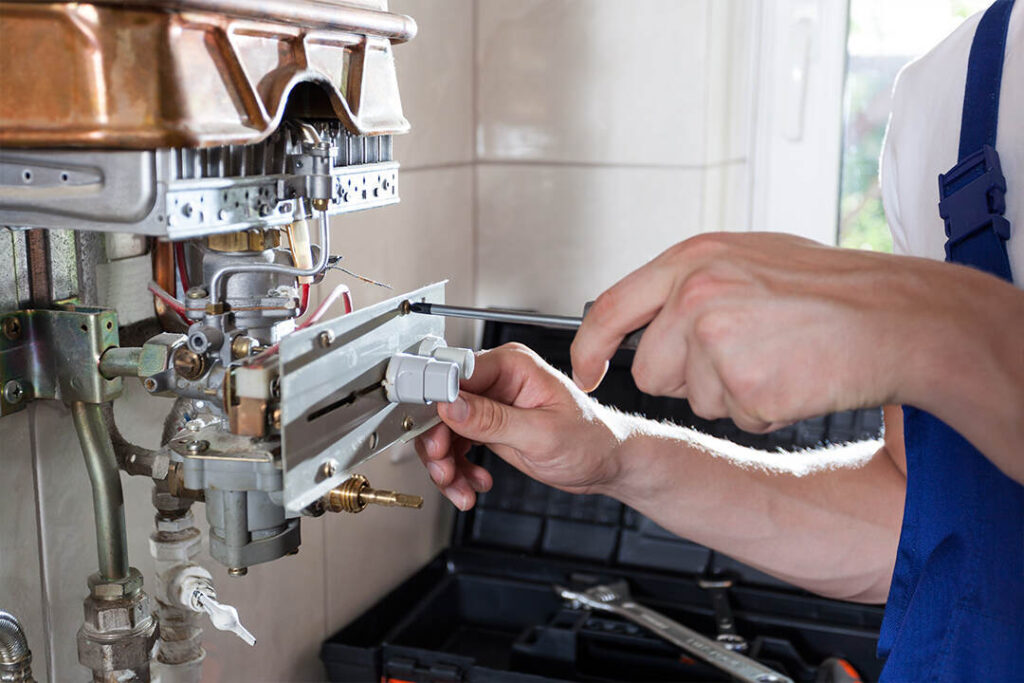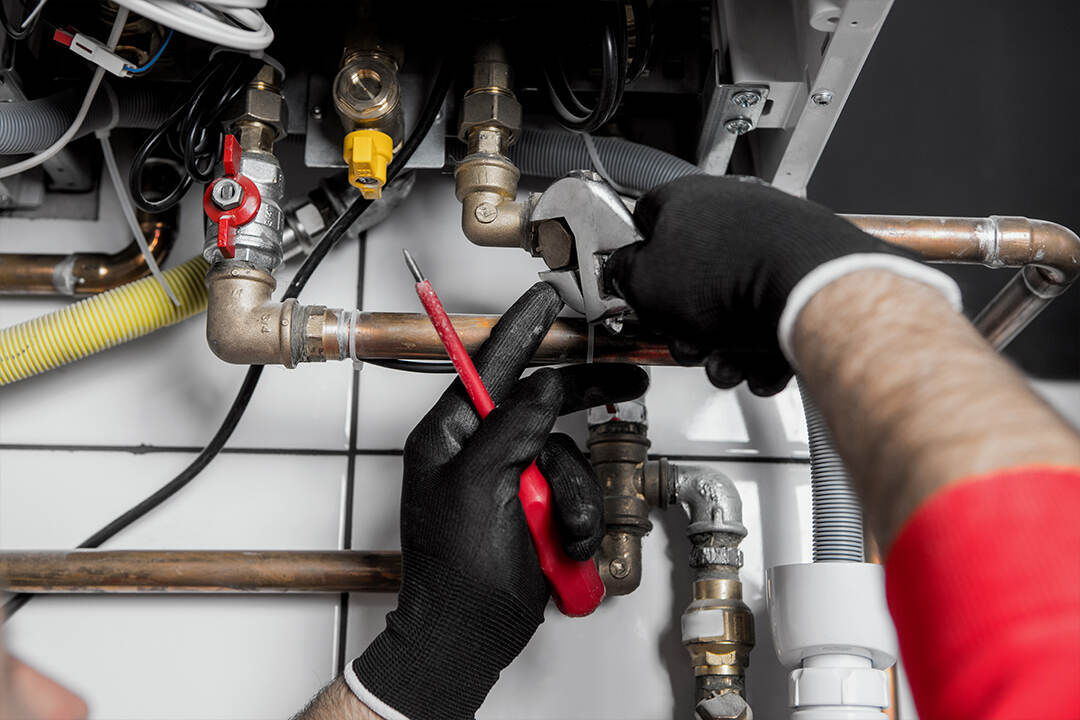Table of Contents
Boilers are an important component of many UK homes as well as industrial processes, so following safety boiler measures is mandatory. They generate steam or hot water for heating, power generation, and other applications. However, boilers can be risky if they are not adequately maintained or repaired. Boiler repairs should only be made by trained and experienced professionals who follow safety measures to prevent accidents.
Understanding Boilers Basics
It is mandatory to have a basic understanding of safety boiler measures and how boilers work before attempting any boiler repairs. Boilers produce steam, which is used for heating homes and supplying warm water. They are available in different sizes and types, but all boilers have the same basic features.
Boilers Components
The main components of a boiler include:
|
Main Components of a boiler |
|
| Burner | The burner is responsible for merging air and fuel and igniting the mixture to generate heat. |
| Heat exchanger | The heat from the burner is transferred to the water to produce steam. |
| Safety valve | The safety valve releases the gas from the boiler if it gets too high. You should never turn off this important safety option. |
| Control system | The control system is in charge of keeping the boiler at the right temperature and pressure. It is important to ensure the control system is functioning properly before attempting any repairs. |
Boilers Operation
Boilers operate by heating water to generate steam, which is used for heating homes and maintaining consistent supply of warm water. The process starts with the burner, which merges fuel and air and ignites the mixture to generate heat. The heat is then sent to the water in the heat exchanger, where it turns into steam.
- It is important to monitor the boiler’s water level to ensure it is always within safe limits. The heat exchanger can get broken if the water level drops too low, and the boiler could get too compressed.
- The safety valve is intended to release pressure if the boiler becomes overpressurized. It is important to ensure it is functioning properly and has not been disabled.
- The control system is in charge of keeping the boiler at the right temperature and pressure. If the control system isn’t working properly, the boiler can get too hot or too under pressure, which can be dangerous.
- To sum up, knowing the basics of how boilers work is helpful before beginning any repairs. It will help to ensure that the repairs are done perfectly and safely.

Safety Precautions
Before attempting any boiler repairs, it is crucial to take necessary safety boiler measures to protect from accidents and injuries. We will talk about some safety steps that should be taken before starting any boiler repair work in this part.
Personal Protective Equipment
Personal protective equipment (PPE) must be worn at all times while working on a boiler to avoid getting injured. The following safety gear should be worn:
- Safety glasses or goggles
- Hard hat
- Heat-resistant gloves
- Steel-toed boots
- Respirator or dust mask
- Flame-resistant clothing
Clear Working Area
It is crucial to have a clear working area around the boiler before beginning any repair work. This will help to protect from any accidents due to tripping or falling. Below are steps that should be taken to ensure a clear working area:
- Remove any unnecessary equipment from the work area.
- Ensure that the floor is clean and free of any debris.
- Mark off the area with caution tape or cones to prevent any unauthorised access.
Proper Ventilation
When working on a boiler, it’s important to have sufficient airflow so dangerous gases don’t build up. To make sure there is enough airflow, the following steps should be taken:
- Open all windows and doors to allow air to circulate
- Check the air quality with a gas tester
- Use a fan or blower to increase airflow
The risk of accidents and injuries can be minimised, and boiler repair work can be completed efficiently and safely, by taking these safety boiler measures,
Pre-Repair boiler Checklist
Before attempting any boiler repairs, it is important to take essential safety measures to prevent accidents and injuries. Before you start any boiler repair work, you should do the following:
|
Pre-Repair Boiler Checklist |
|
| Turn Off the Power Supply | The first step in any boiler repair work is to power off the boiler’s supply. This will protect against electrical shocks and fires that can happen by mistake. When you turn off the power source, make sure to follow the manufacturer’s directions and safety rules |
| Ventilate the Area | It is important to ventilate the area before starting any repair work to prevent the accumulation of hazardous gases. Open all the windows and doors to allow air to circulate in the room, and if possible, use a fan to improve air circulation. |
| Drain the Boiler | Before attempting any repairs, it is important to drain the boiler to prevent accidental burns or scalds. Ensure to follow the manufacturer’s instructions and safety measures when draining the boiler. |
| Wear Protective Gear | Wearing protective gear to prevent injuries is mandatory. This includes safety glasses, a hard hat, and gloves when working on a boiler. Follow the manufacturer’s instructions and safety boiler measures when selecting and wearing protective gear. |
| Inspect the Boiler | Before starting any repair work, it is important to inspect the boiler for signs of damage or wear. This includes checking for cracks, leaks, and corrosion. Ensure to follow the manufacturer’s instructions and safety guidelines when inspecting the boiler. |
You can ensure that you are taking necessary safety measures before attempting boiler repairs. Remember to follow the manufacturer’s instructions to avoid accidents and harm.
Professional Assistance
- Repairing a boiler can be hard and dangerous, so it’s best to get help from a professional before you try to do it yourself. A professional boiler technician has the necessary training, experience, and knowledge to identify and resolve any issues with your boiler safely and efficiently.
- When choosing a professional boiler technician, consider their credentials and experience. Look for a technician who is certified by recognized organisations. Make sure that the technician has the necessary skills and knowledge to perform boiler repairs safely and effectively.
- A professional boiler technician will also have access to specialised tools and equipment that are required for boiler repairs. They will be able to diagnose the issue with your boiler quickly and accurately and recommend the appropriate repairs or replacements.
- It is also essential to note that attempting to repair a boiler on your own can be unsafe and can result in serious injury or even death. Boilers operate under high pressure and temperature, and any mistakes during the repair process can have devastating consequences.
- To sum up, getting professional help with any boiler repairs is important for the safety of both the user and the technician. A qualified and certified boiler technician will know how to safely find and fix any problems with your boiler because they have the training, experience, and tools to do so.
Conclusion
In conclusion, safety boiler measures are necessary because repair work can be unsafe. Before attempting any repairs, it is important to ensure that the boiler is turned off and has cooled to a safe temperature.
Furthermore, it’s essential to wear the proper personal protective equipment (PPE), like safety glasses, gloves, and, if needed, a mask. The tools that are used should be in good shape and right for the repair work.
Also, it’s essential to follow all rules and instructions from the maker and any local, state, or federal laws that apply. Regular maintenance can keep the boiler safe and in good shape so that it doesn’t need to be fixed as often.
People who work with boilers can help keep themselves safe from accidents and injuries by taking these precautions.



